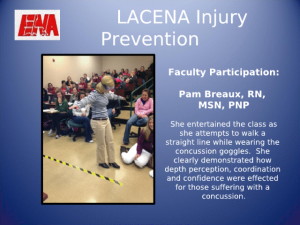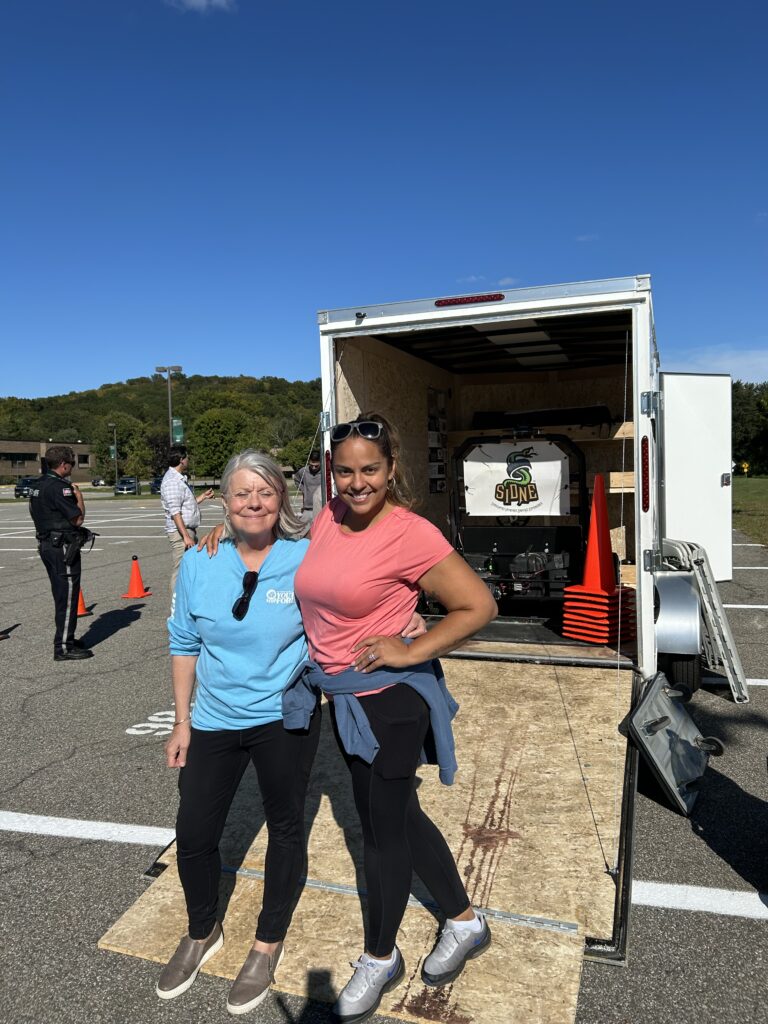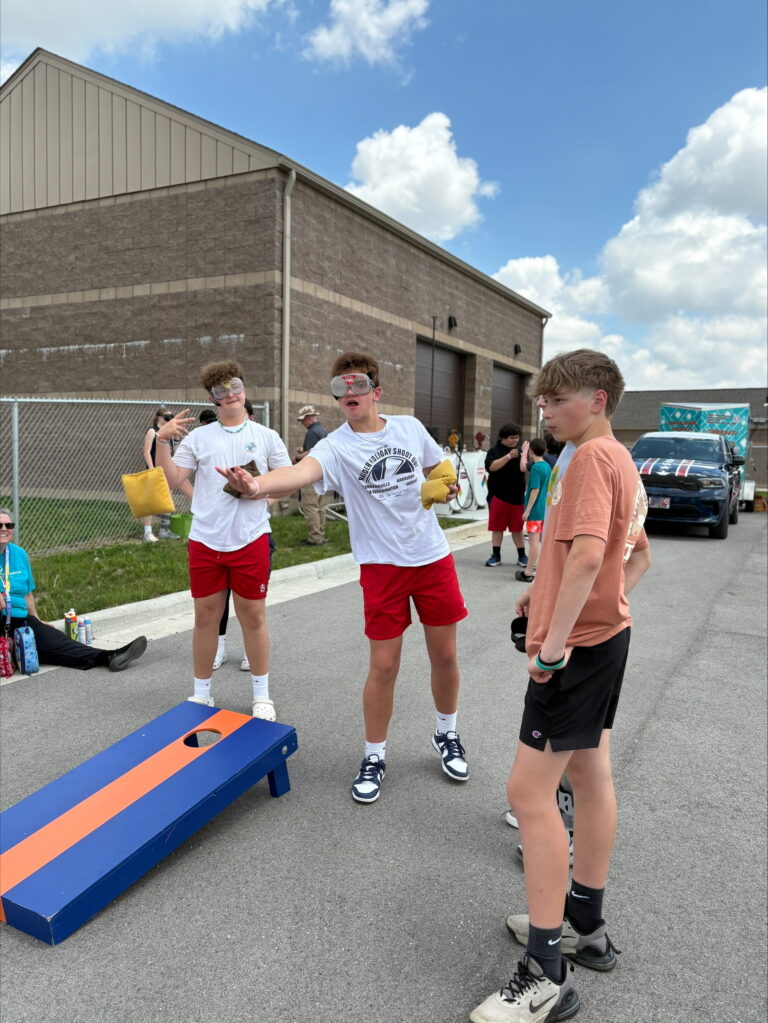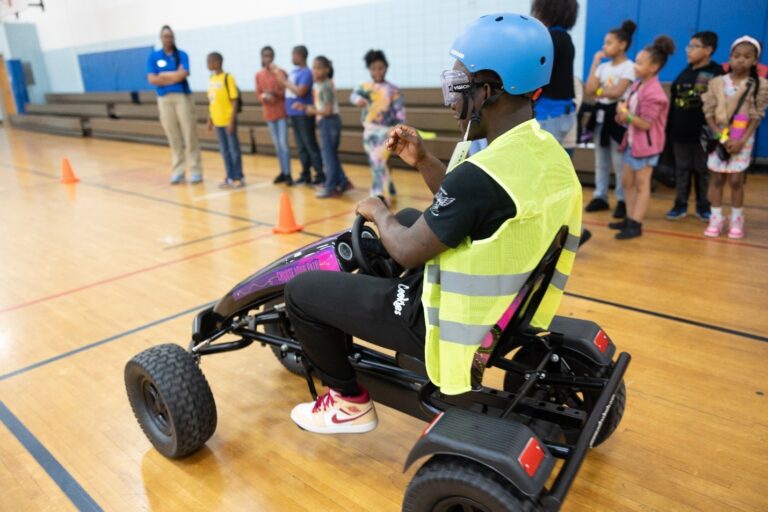The
Concussion Goggle® demonstrates how depth perception, coordination, and confidence are affected when suffering from a concussion.
Did you know that, according to the Centers for Disease Control (CDC), traumatic brain injury (TBI) is one of the leading causes of death and disability among children and youth? Many of these injuries occur on the sports field. TBIs may include loss of consciousness, skull fractures, amnesia, neurological abnormalities, intracranial lesions, and even death. To address the problem right where the injuries often occur, the CDC created the Heads Up program, which educates coaches, athletes, and parents about TBI and most importantly what to do about it.
Louisiana is one of the states that takes advantage of this program, but the over 450 -member-strong Louisiana Council of the Emergency Nurses Association (LCENA) wanted to go further to address TBI concerns. Last year the association supported initiative, Louisiana Act 314, was passed by the Louisiana Legislature. LCENA member Deb Spann introduced the measure to the State Board of Directors.
“That (initiative) is directed to preventing children participating in organized sports from returning to the field of play before being cleared by a physician,” Spann explains. “During that meeting our group collaborated on the best way to support getting the message out to the public from an emergency nursing perspective.”
Spann and LCENA members were already familiar with Fatal Vision® products. “We first worked with Fatal Vision® products in collaboration with our law enforcement partners in impaired driving programs,” she says, “and were impressed with the realism that the product lent to the students.”
 So when one member found an article that referenced a new product, Concussion Goggles™, LCENA members’ interest was immediately piqued. Once Louisiana Act 314 was introduced, the group made the decision to purchase six sets of goggles for use across the state.
So when one member found an article that referenced a new product, Concussion Goggles™, LCENA members’ interest was immediately piqued. Once Louisiana Act 314 was introduced, the group made the decision to purchase six sets of goggles for use across the state.
“We have used the goggles with many different age groups from elementary to high school to college students,” Spann says, noting that they’ve targeted nursing students in pediatric and neurology classes. “We have also used them in the community with coaches from all areas of organized sports at schools and in the public sector.”
One of the group’s primary outreach foci to date has been using the Concussion Goggles™ in conjunction with the CDC’s Heads Up program, which itself focuses on organized sports and youth. Spann is quick to add that her group, along with partner organization Louisiana Emergency Response Network, would gladly moderate the program’s content for any interested group.
The Concussion Goggles™ work particularly well with the Heads Up program in large part because they effectively and realistically mimic the effects of a traumatic brain injury. Participants go through an interactive presentation combining classroom discussion with mental, physical, and dexterity tests. Participants first perform those tests without the Concussion Goggles™ to get a behavior baseline. Then participants immediately perform the same tasks while wearing the goggles and experience all the visual disconnect, apprehension, confusion, hesitation, and disorientation a TBI sufferer would.
“All who have used the goggles have been impressed with the realism of the product,” Spann says.
The Concussion Goggles™ also fit in well with the Heads Up materials, which include curricula specific to coaches, students, and parents. Spann says having a pre-packaged program like this is priceless because it allows an emergency room nurse to do a complete, professional presentation without having to create a program from scratch. It also fits well with other safety programs. This streamlines the process for these nurses, who volunteer their time to the program.
“Having such a dramatic product and well-defined program to pair with it is an attention-grabber that works every time,” Spann says.
That doesn’t mean that the program doesn’t face some challenges. Time to meet the number of requests is one challenge. Another is not having enough sets of Concussion Goggles™ to go around. The Louisiana Council of the Emergency Nurses Association has made plans to purchase more sets to meet that demand.
Meanwhile, LCENA plans to stick with their current focus for the foreseeable future.
“I am convinced that they (the Concussion Goggles™) make a significant difference in our ability to deliver an important message,” Spann says. “I look forward to having more sets in the state so that I can have one to use exclusively.
Links for more information




 So when one member found an article that referenced a new product, Concussion Goggles™, LCENA members’ interest was immediately piqued. Once Louisiana Act 314 was introduced, the group made the decision to purchase six sets of goggles for use across the state.
So when one member found an article that referenced a new product, Concussion Goggles™, LCENA members’ interest was immediately piqued. Once Louisiana Act 314 was introduced, the group made the decision to purchase six sets of goggles for use across the state.
